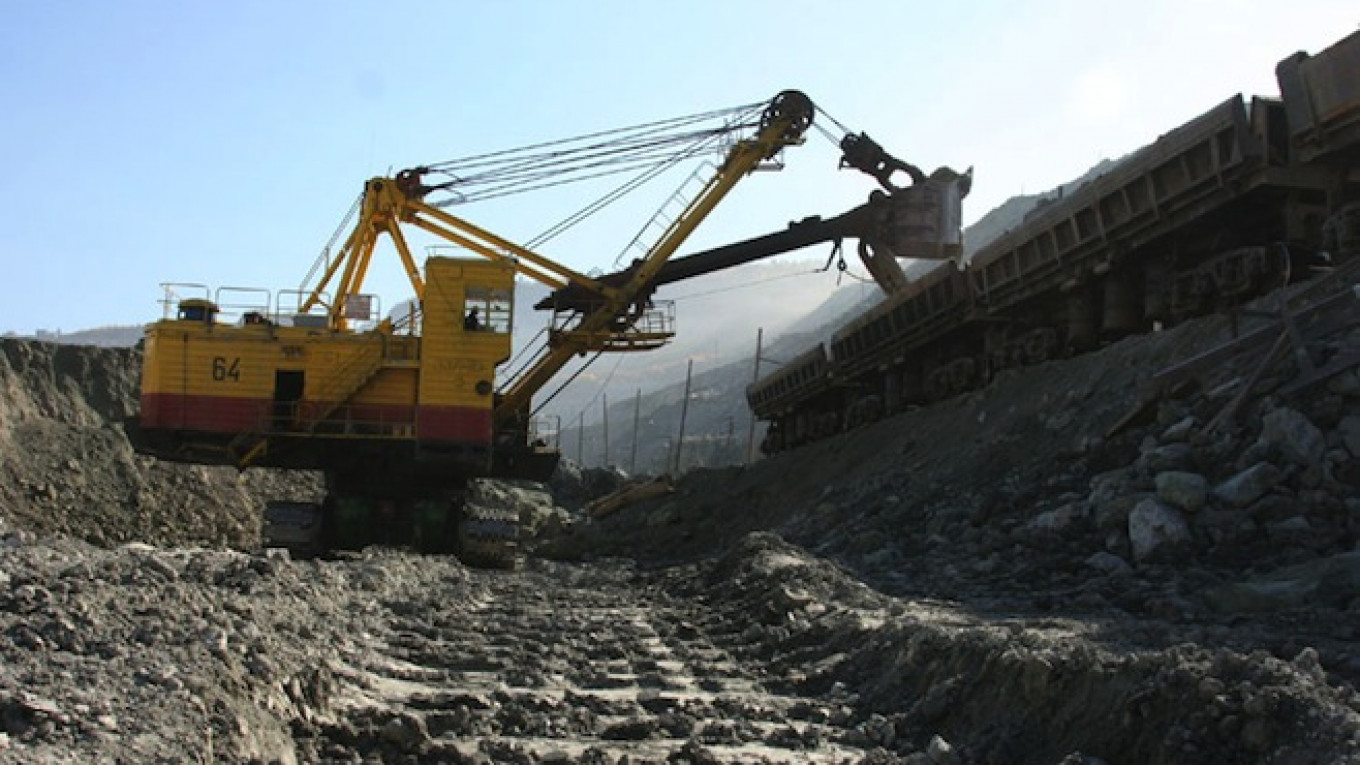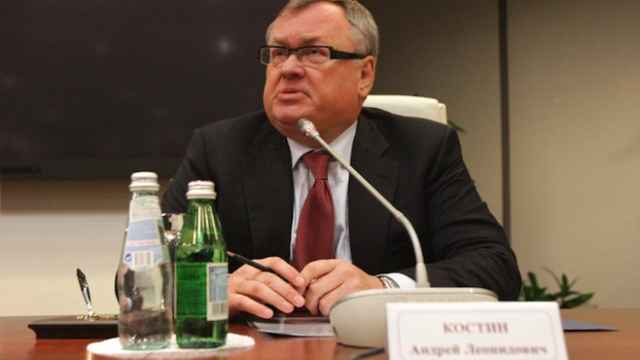Shares in Russian miner Mechel tumbled almost 40 percent Tuesday as fears grow that it will be forced to declare bankruptcy in a final deal with creditors over debts of $9 billion, following months of torturous negotiations involving both banks and government officials.
Shortly after 2 p.m. in Moscow, Mechel stock was down 39.9 percent at 16.4 rubles, the lowest price ever recorded, according to data from the Moscow Exchange.
The bourse said in a statement that it was obliged to briefly impose restrictions on trading after Mechel shares dropped more than 20 percent within 10 minutes.
While the stock later pared losses to close down 31.1 percent at 18.8 rubles, the value of the company has almost halved since Saturday, when Economic Development Minister Alexei Ulyukayev said bankruptcy was all but inevitable.
Mechel's U.S. depositary receipts plummeted 30 percent in New York on Monday.
The stock's collapse appears to herald the final act in months of drama as Mechel's majority shareholder, reclusive mining engineer Igor Zyuzin, has sought to retain control over the debt-stricken company by cutting a deal with creditors.
With mining, steel production and power assets across Russia as well as in the United States and Europe, Mechel has been foundering since heavy borrowing after the 2008 financial crisis left it dangerously exposed to sliding commodity prices.
Last year, the company paid interest on its debt of $742 million, just over its $730 EBITDA earnings.
Four years ago a share in Mechel was worth 745 rubles — 46 times more than today. This year alone Mechel's stock price has fallen 74 percent. The company's capitalization at the end of Tuesday's trading was 7.9 billion rubles ($200 million).
The stock's most recent rout began Monday after Ulyukayev said he could see “no other way out” for Mechel besides bankruptcy, according to quotes carried by Bloomberg.
State-owned Russian banks VTB, Sberbank, Gazprombank and Vnesheconombank are Mechel's biggest creditors. Under pressure since Western sanctions over Ukraine cut them off from most international capital markets, the financial institutions have sought to force the struggling Mechel to convert its debt into equity.
Mechel chief executive Oleg Korzhov told business daily Vedomosti earlier this month that the company was being pushed to accept a settlement where Zyuzin's stake would be reduced to 10 percent and VTB, Sberbank and Gazprombank would assume control of 75 percent of the company.
If Mechel will not convert its debt into equity the only option is bankruptcy and a court settlement, VTB head Andrei Kostin was quoted by Interfax as saying Friday.
While Mechel was not mentioned in an official transcript of a meeting between President Vladimir Putin and Kostin on Monday, Putin warned the VTB head that state support should not be extended to companies that had created their own financial problems.
Putin's spokesman, Dmitry Peskov, said this month that Mechel's fate is not a question for the president, but Putin's words have had a dramatic effect on the company in the past.
In 2008, billions of dollars were wiped off Mechel's value when then-Prime Minister Putin accused the company of tax evasion and threatened to “send a doctor” to Zyuzin, who had skipped a meeting because of illness.
Squeezed by Western sanctions and an economy hovering on the brink of recession, Russia currently has little spare money available to bail out Mechel, which has already carried out several debt restructurings.
State-owned development bank Vnesheconombank refused to take part in a plan to save Mechel earlier this year and in July a government minister said for the first time that it could be allowed to go bust.
Mechel has unsuccessfully attempted to sell some of its assets in recent months, including a railroad to its Elga coal mine in Russia's Far East worth up to 70 billion rubles ($1.8 billion).
The falling share price could be a way of pressurizing Zyuzin, who currently owns 67.4 percent of Mechel, and weakening his negotiating position, said Mikhail Smirnov, a metals analyst at Metropol in Moscow.
Zyuzin's personal fortune has dwindled from $8.9 billion in 2011 to $450 million this year, according to Forbes magazine.
“You can understand Zyuzin,” said Smirnov. “If there was a conversion [of debt into equity] then he would be left with a stake worth kopeks … from a billionaire he would become an average Russian citizen.”
Contact the author at h.amos@imedia.ru
A Message from The Moscow Times:
Dear readers,
We are facing unprecedented challenges. Russia's Prosecutor General's Office has designated The Moscow Times as an "undesirable" organization, criminalizing our work and putting our staff at risk of prosecution. This follows our earlier unjust labeling as a "foreign agent."
These actions are direct attempts to silence independent journalism in Russia. The authorities claim our work "discredits the decisions of the Russian leadership." We see things differently: we strive to provide accurate, unbiased reporting on Russia.
We, the journalists of The Moscow Times, refuse to be silenced. But to continue our work, we need your help.
Your support, no matter how small, makes a world of difference. If you can, please support us monthly starting from just $2. It's quick to set up, and every contribution makes a significant impact.
By supporting The Moscow Times, you're defending open, independent journalism in the face of repression. Thank you for standing with us.
Remind me later.







